Northeastern Graduates: “What World Do You Want to Live In?”
Northeastern University College of Professional Studies Confers More than 1,100 Degrees
“What world do you want to live in?”
That was the question posed this morning to more than 1,000 graduates at Matthews Arena on Northeastern’s Boston campus by graduation speaker Dr. Fred Frelow, education and scholarship senior program officer at the Ford Foundation, one of the largest foundations in the U.S. driving social change.
Thousands of family members and friends were in attendance, celebrating a total of 1,123 degrees conferred—14 Associate, 235 Bachelor’s, 732 Master’s, 10 Certificate of Advanced Graduate Studies, and 132 Doctoral, one of the largest graduating classes of doctoral graduates to date. On Thursday, May 14, the College hosted a Doctoral Hooding Ceremony for candidates in the Doctor of Education, Doctor of Law and Policy, and Doctor of Physical Therapy programs symbolizing their transition from student to scholar-practitioner.
Frelow, who has dedicated his career to the transformation of education, encouraged all graduates, no matter what degree they earned, that “…whatever field you may work in after graduation, you can have an impact on other people and on the world around you that you may not realize or be able to measure until many years later.”
In addition to one of the largest graduating classes of doctoral graduates, this year’s class included other “firsts” and special guests connected to Northeastern around the world:
First Homeland Security Graduating Class
Eleven students in the Master’s in Homeland Security are the first to graduate since the program’s inception in 2013. They studied intelligence gathering and analysis, emergency planning and management, and social psychology, among other skills. Recently, National Guard Bureau Chief General Frank J. Grass, a four-star general, praised the program’s first-of-its-kind partnership with the National Guard.
First Graduate from Boston Ballet Program
Sarah Wroth is the first dancer to graduate from the unique program between the Boston Ballet and the College, which allows dancers to pursue their degrees while dancing, preparing them for a career outside of ballet once their dancing careers end. Wroth graduated with her Master’s in Nonprofit Management.
Students from Hong Kong and Vietnam Programs Graduate in Boston
Students in Northeastern’s Doctor of Education program in Hong Kong celebrated as the first graduating cohort of the program. Three of the four graduates traveled to Boston to take part in graduation: Ratanaporn Choklap, Ching Wai Rebecca Ong, and Daya Datwani Choy.
Additionally, the first nine graduates of the College’s joint Master’s in Leadership program with International University, in Ho Chi Minh City, Vietnam, marked the first cohort to complete the program, which was established in 2012. The College welcomed one of the students, Quang Pham, to graduation.
Exemplary Teaching and Social Impact
During graduation, the College presented the Teaching Excellence Award to two outstanding faculty members: Dr. Joseph McNabb and Cynthia Lynn Beers. The College also awarded the Dean’s Social Impact Award to William A. Lowell, for his lifetime of commitment to providing opportunities in education. Lowell is a trustee of the Lowell Institute, an educational foundation formed by his family in 1836 and one of the oldest continuing foundations in the country. Most recently, the Lowell Institute awarded $4 million to re-imagine the Lowell Institute School at the College as a first-in-the-nation undergraduate school focused on students completing degrees in science, technology, and engineering in preparation for participation in the innovation economy.
Students Receive Degree of the Highest Honor: Their Doctorate
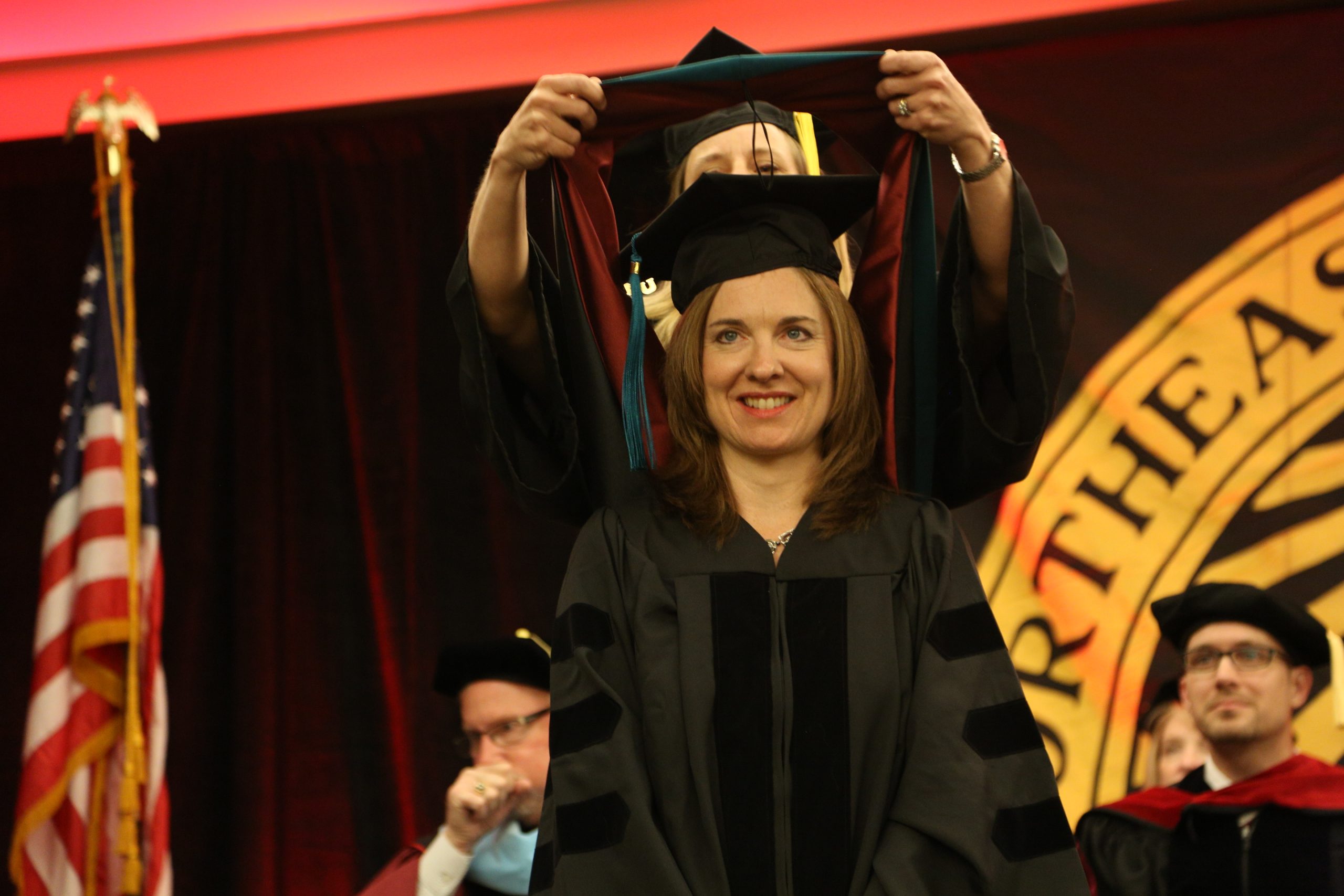
Dean’s Medal Winner, Dr. Lyne Archambault-Ezenwa, is hooded by her thesis advisor.
On May 14, doctoral candidates of the Doctor of Education, Doctor of Law and Policy, and Doctor of Physical Therapy programs received their doctoral hoods from their thesis advisers at the College’s annual hooding ceremony.
At every doctoral hooding ceremony, one student is selected to receive the Dean’s Medal for Outstanding Doctoral Work, the highest honor awarded by the College to a doctoral graduate. The award was established to acknowledge exemplary academic achievement and to recognize demonstrated creativity.
This year, the Dean’s Medal winner was Dr. Lyne Archambault-Ezenwa for her thesis titled “A Comprehensive Physical Therapy Approach to the Evaluation and Treatment of Constipation—A Case Report,” which addresses a diagnosis not usually considered in the realm of physical therapy treatment. Her thesis advisers note in their nomination that “her work provides education to the consumer and medical community, highlighting the importance of comprehensive evaluation to include a whole body approach.” Dr. Archambault-Ezenwa has her own physical therapy practice and is vice president of E’ssential Health and Wellness, Inc., in Houston.
Dr. Susan Lowe, a faculty member in the Doctor of Physical Therapy program, was the faculty speaker. A Northeastern faculty member since 1989, Lowe specializes clinically in geriatric physical therapy and has taught the geriatric content for Northeastern’s physical therapy program for more than 25 years.
Lowe described the diverse range of thesis topics the doctoral graduates had researched: Doctor of Education graduates investigated such topics as students coping with parental loss; graduates in the Doctor of Law and Policy program researched the impact of employment laws on domestic violence, renewable energy, climate change, and agriculture in California; and graduates in the Doctor of Physical Therapy program provided new evidence in areas including the relationship between mild traumatic brain injury and foul tips incurred by Major League baseball catchers.
“The combined effective actions of the graduates in this room has resulted in over 175 new pieces of evidence that will positively impact the fields of education, health care, and public policy,” she said.
About Northeastern University College of Professional Studies
Northeastern University College of Professional Studies is one of nine colleges that form the university. Northeastern University is recognized for academic excellence, ranking in the top 50 universities in the United States in U.S. News & World Report, as well as ranking sixth among U.S. universities sought by international students. Northeastern is renowned for experiential education, and the College of Professional Studies incorporates this strength in career-focused professional education at the bachelor’s, master’s, and doctoral levels. Degrees reflect business needs, the reality of the present economy, and areas of professional growth and demand.
$4 Million Gift Supports First-in-Nation Undergraduate STEM-Focused Program for Continuing Students
November 4, 2014 – As education, government and business leaders gathered for the Massachusetts STEM Summit in Worcester, MA, recently to address the shortage of college graduates in STEM fields (science, technology, engineering and math) and the critical role they play in the technology-driven 21st century economy, the Lowell Institute is investing $4 million to expand the mission of the undergraduate curriculum at Northeastern University College of Professional Studies to address the challenge.
“The Lowell Institute School at Northeastern University will address two critical issues: the low bachelor’s degree graduation rates among working adults who have some college credits, and the growing need of employers for qualified STEM graduates by connecting the two issues in a unique way,” explained John LaBrie, dean, Northeastern University College of Professional Studies.
Experiential Education for Careers in STEM
The Lowell Institute School will offer STEM-focused bachelor’s degree programs for students who bring partial college credits into the program. Degrees will be offered in hybrid and fully-online formats, enriched by Northeastern’s hallmark experiential education throughout the curriculum, ranging from course assignments addressing current industry challenges to opportunities for co-op learning and work experiences.
Funding from the Lowell Institute will support curriculum development, hiring of faculty members, laboratories, and scholarship support. When the Lowell Institute was founded in the early 19th century, it focused on bringing the breadth and depth of quality education available in the Boston area to a wider circle of people eager to learn and advance in their careers.
Now, William Lowell envisions the Lowell Institute School in today’s context: “I think there’s a need as much as ever in the modern economy, certainly locally where employers express some frustration about the gap between the people they’re trying to hire for jobs that need to be filled, and the training of the available workforce.”
Since 2004, the College of Professional Studies has offered fast track bachelor’s of science degree programs to qualified students resulting in graduation rates of 90% or better, compared to the national average of 34% for students who re-entered higher education.
STEM Summit
Academic leaders from the College of Professional Studies participated in the Massachusetts STEM Summit, noting the critical need for engagement across the spectrum of higher education with the industries that will ultimately employ graduates. Biology faculty member Sandra M Buerger, PhD, spoke on the topic: “Aligning Expectations Between Community College Life Sciences Programs and Life Sciences Companies.”
About Northeastern University College of Professional Studies
Northeastern University College of Professional Studies is one of nine colleges that form the university. Northeastern University is recognized for academic excellence, ranking in the top 50 universities in the United States in U.S. News & World Report, as well as ranking sixth among U.S. universities sought by international students. Northeastern is renowned for experiential education, and the College of Professional Studies incorporates this strength in career-focused professional education at the bachelor’s, master’s, and doctoral levels. Degrees reflect business needs, the reality of the present economy, and areas of professional growth and demand.
Graduates of a University Engaged with the World
Northeastern University College of Professional Studies Confers 1,093 Degrees
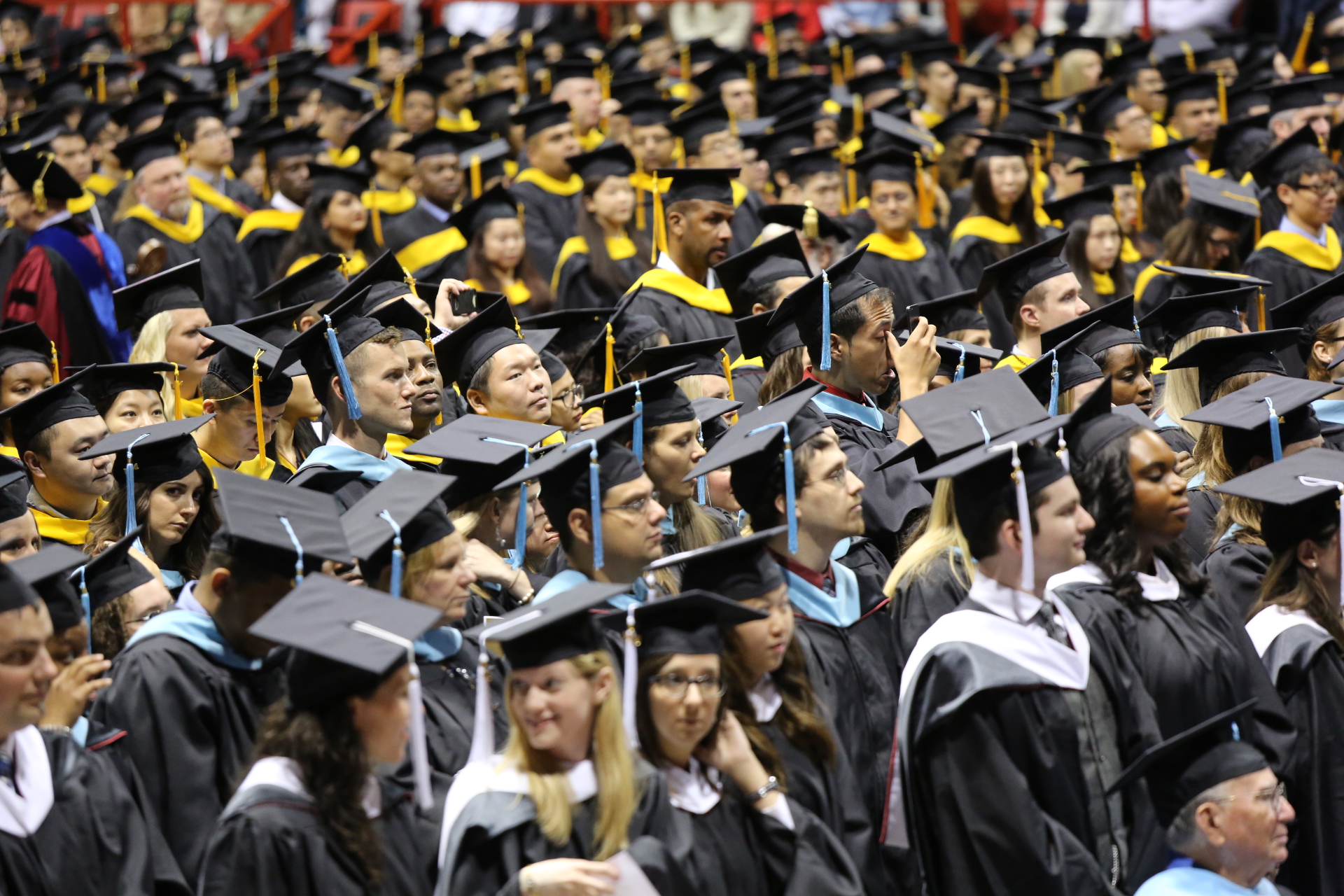
Photo by Heratch Ekmekjian
With thousands of family members and friends in attendance, graduates ranging from the associate level through doctorate graduated on Friday, June 6, at Matthews Arena on the Northeastern University campus in Boston, MA.
A total of 1,093 degrees were conferred – 18 Associate, 252 Bachelor’s, 721 Master’s, 6 Certificate of Advanced Graduate Studies, and 96 Doctoral. On Thursday, June 5th, the college hosted a Doctoral Hooding Ceremony for doctoral candidates in the Doctor of Education, Doctor of Law and Policy, and Doctor of Physical Therapy programs symbolizing their transition from student to scholar-practitioner.
Graduates received advice from graduation speaker, Dr. Mark Albion, who offered two “don’ts” and three “do’s”:
- Don’t get really good at what you don’t want to do.
- Don’t defer your life plan.
- Do turn your values into value.
- Do surround yourself with a community of love.
- Do know how to measure success.
Albion is a former Harvard Business School professor and university administrator who has co-founded seven companies, including the global young leadership organization, Net Impact. Albion’s latest venture is More Than Money Careers, which provides a self-leadership, career platform that helps students, young professionals, and alumni “get clear, connected and hired” for well-paying impact jobs that fit their values—using their heads to follow their hearts.
Exemplary Teaching and Social Impact
During graduation, the College presented the Teaching Excellence Award to two outstanding faculty members: Dr. Gail Matthews DeNatale and Dr. Arsenio Paez.
And, the College awarded the Dean’s Social Impact Award to Elizabeth McLellan RN MSN MPH. She is President and Founder of Partners for World Health, a non-governmental organization dedicated to improving health care around the world by improving the medical supply chain and coordinating medical missions in Africa, Asia, and South America to promote capacity building and training.
Students Receive Degree of the Highest Honor: Their Doctorate
The previous day, Thursday, June 5, the doctoral candidates of the Transitional Doctor of Physical Therapy, Doctor of Law and Policy, and Doctor of Education programs were honored at the annual ceremony, receiving their doctoral hoods from their thesis advisers.
At each doctoral hooding ceremony, one student is selected to receive the Dean’s Medal for Outstanding Doctoral Work, the highest honor awarded by the College to a doctoral graduate. The award was established to acknowledge exemplary academic achievement and to recognize demonstrated creativity. This year, the Dean’s Medal winner was Dr. Sean Robert Gallagher for his thesis entitled Major Employers’ Hiring Practices and the Evolving Function of the Professional Master’s Degree. Gallagher is Chief Strategy Officer at Northeastern University.
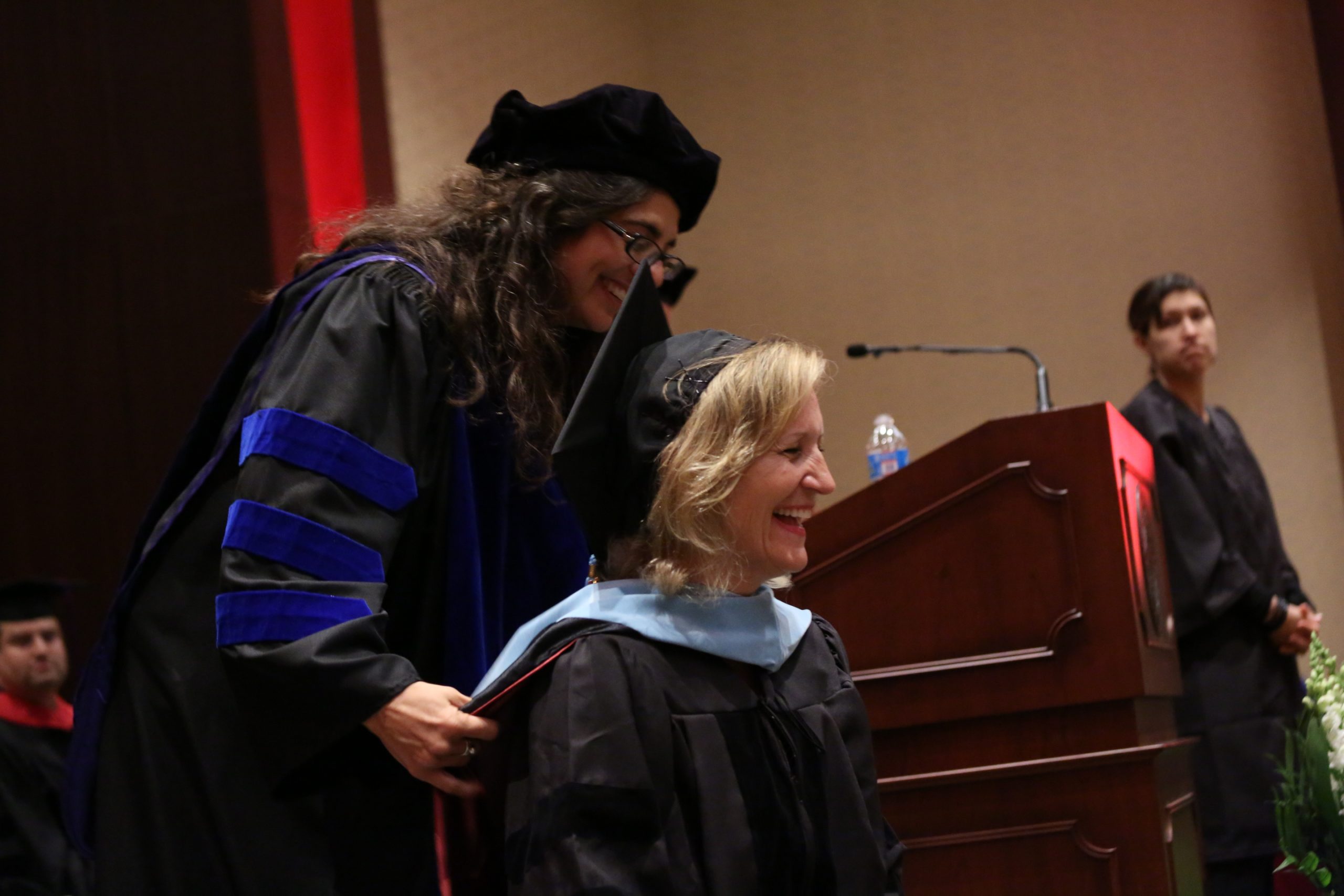
Graduation culminates the 2013-14 academic year that saw many changes at the College of Professional Studies including: Growth and Change
- Faculty member Tova Olson Sanders was one of two award recipients of Northeastern’s highest teaching honor.
- Enrollment of students in the College’s two newest degree programs: Master of Arts in Homeland Security and Master of Science in Regulatory Affairs of Food and Food Industries.
- Addition of three former ambassadors to the faculty of the Master of Science in Global Studies and International Relations degree program.
- The launch of a graduate program in Ho Chi Minh City, Vietnam – the Master of Science in Leadership degree in cooperation with International University of Vietnam.
- The arrival of Northeastern’s first cohort of students from Nigeria, studying in a summer bridge program at Northeastern and University of Vermont. Approximately 40 students from Nigeria are expected to matriculate into degree programs at Northeastern in the fall of 2014.
- Stan Phanord, a graduate of Foundation Year, the intensive first-year college program, graduated from Northeastern this year with a Fulbright Fellowship and a Rangel Fellowship, establishing his path to graduate studies and a career in diplomacy.
Northeastern University College of Professional Studies is one of nine colleges that form the university. Northeastern University is recognized for academic excellence, ranking in the top 50 universities in the United States in U.S. News & World Report and is ranked 6th among U.S. universities sought by international students. Northeastern is renowned for experiential education, and the College of Professional Studies incorporates that strength in career-focused professional education at the bachelor’s, master’s, and doctoral levels. Degrees reflect business needs, the reality of the present economy, and areas of professional growth and demand.
Most business leaders believe innovation is critical for U.S. colleges to remain globally competitive
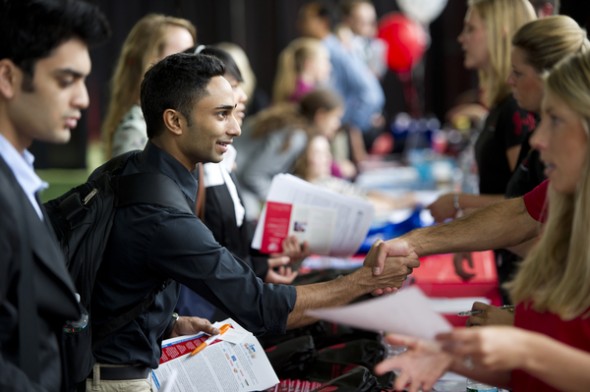
Photo by Brooks Canaday
At a time of great debate over the value of a college degree, a new national survey reveals a concern among U.S. business leaders about the pipeline of talent produced by American colleges and universities. While most executives express support for the American system of higher education, they also believe the U.S. is falling behind global competitors and inadequately preparing graduates to succeed in the modern workforce.
The new survey, the third in a series by Northeastern University, presents the views of C-suite executives, with a particular focus on global competitiveness, the employee skills gap, employer workforce investments, and opportunities for policy reform.
According to the new survey, more than half of business executives (54 percent) believe the U.S. is lagging behind developed and emerging countries when it comes to preparing college graduates for career success.
The report also highlights a concern from the C-suite about the notion of an employee “skills gap.” Nationally, 73 percent of business leaders say there is a skills gap among today’s workforce, and an even greater number (87 percent) believe that today’s college graduates lack the necessary skills to succeed.
“These findings underscore a critical call to action for all of us in higher education to innovate,” said Joseph E. Aoun, president of Northeastern. “Business leaders—who are key partners for colleges and universities—want higher education to be more experiential and want us to instill entrepreneurial qualities in our graduates.”
Regionally, business leaders have somewhat varying views. In Boston, where the concern is less widespread, only 64 percent of executives see a skills gap. In Charlotte, N.C., 71 percent are concerned about a skills gap, while in Seattle the figure is 76 percent. The Northeastern survey oversampled business leaders in Boston, Charlotte, and Seattle—the three American cities where the university maintains campuses.
Among the attributes most important for college graduates to possess, business executives rank communication, interpersonal skills, and adaptability at the top of the list. That echoes the sentiments of the majority of Americans from Northeastern’s August 2013 poll, who said so-called “softer skills” such as communications and problem solving were most important. According to the new survey, nearly one-third (28 percent) of business leaders believe that very few recent college graduates actually possess those skills.
Business leaders are divided on the question of whether college graduates will be more (27 percent), less (32 percent), or equally (39 percent) prepared for the workforce in the next 10–15 years. The findings were consistent across the samples in Boston, Charlotte, and Seattle.
In addition to the hurdles presented by the skills gap, recent graduates face a job market that is in many ways still recovering from the Great Recession. Nearly two-thirds of executives say the recession impacted their businesses, with the most commonly cited consequence being a reduction in the number of entry-level jobs.
Consistent with findings from Northeastern’s previous two surveys, C-suite executives believe that colleges and universities should develop innovative ways to educate and prepare students for the workforce.
An overwhelming majority of respondents (97 percent) say that experiential education—the integration of classroom study with professional experience—is critical to an individual’s success. A large majority of business leaders (89 percent) also believe the nation’s higher education system should expand opportunities for teaching entrepreneurship.
Other noteworthy regional findings include:
• While most U.S. business leaders (72 percent) cite personal drive as the most important factor for career success, business leaders in Boston and Seattle cite the value of mentors and advisers at a higher rate than respondents nationally. While just 27 percent of business leaders across the country place great value on mentors and advisers, the figure is 45 percent of Boston business leaders and 43 percent of their Seattle counterparts.
• Business leaders in Seattle tend to be more supportive of online college degrees. Nearly 6-in-10 Seattle executives say an online degree provides a similar quality of education as traditional degrees, compared to 47 percent in Charlotte and 45 percent in Boston.
The survey interviews were conducted by telephone among a representative sample of more than 500 C-suite executives and business leaders in the U.S. from Feb. 3–19, 2014. It includes an oversample of 300 respondents in Boston, Charlotte, and Seattle. The margin of error is +/- 4.37 for the national sample and +/- 5.65 for the regional sample.
Leading Change in STEM Education at the White House
For Shai Butler, a Doctor of Law & Policy student at Northeastern University College of Professional Studies, an invitation to a high-level event at the White House on advancing STEM fields in education came at the perfect moment (STEM is an acronym referring to the education fields of science, technology, engineering, and mathematics).
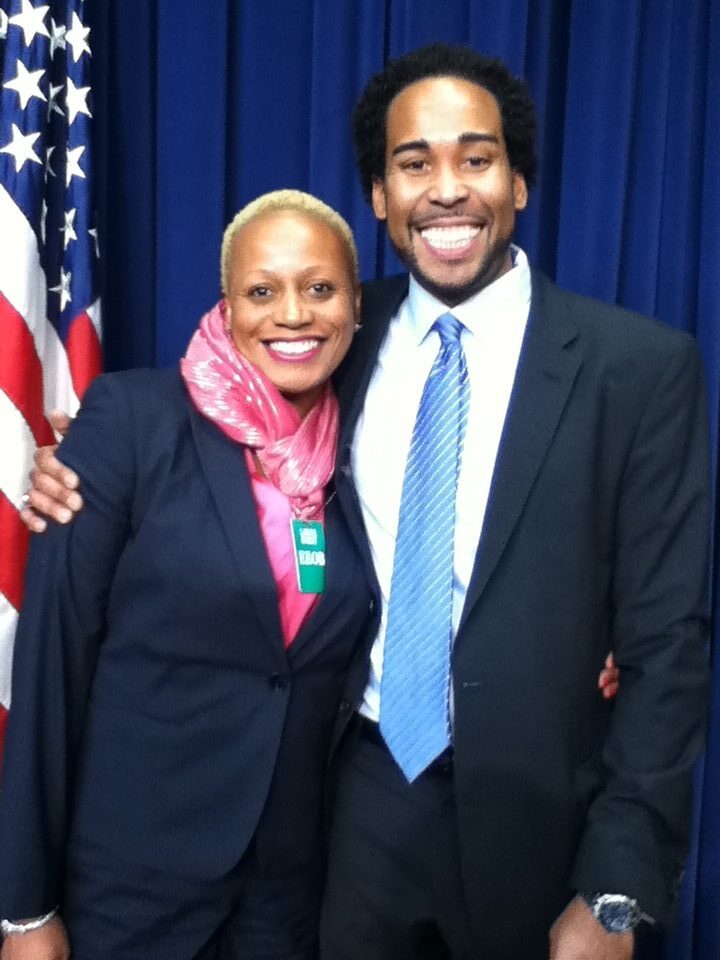
Shai Butler (left) with David Johns, Executive Director, White House Initiative on Educational Excellence for African Americans.
Butler was one of 60 attendees at the White House Office of Science and Technology Policy’s workshop “Closing the Gap: Opportunities to Expand Minority Achievement and Participation in STEM.” Attendees were leading technical experts, representatives from minority professional societies, nonprofit organizations, and other key stakeholders who are working, like Butler, to help minorities excel in STEM studies and careers.Butler is currently working on her doctoral thesis developing a model that improves outcomes for economically disadvantaged students majoring in STEM fields in New York state by reducing debt, improving academic and career readiness and increasing employment rates. Attending the White House Champions of Change event was an opportunity for Butler to learn what others are doing to advance minority students in STEM fields, and to further her own research. As the Chief Diversity Officer for the College of Saint Rose in Albany, New York, Butler’s professional experience and her doctoral research are complementary and inform one another. The Doctor of Law and Policy program encourages in-depth policy analysis to prepare its students to become policy makers and changers in their field of study – exactly what Butler has set out to do.
By taking advantage of a strong professional network, one of the benefits of studying in a cohort-based doctoral program, Butler reported that she was able to connect to the White House event’s Program Director through a colleague in her doctoral program. Networking opportunities at the conference inspired her to consider new horizons in her doctoral research.
While at the event, Butler was able to meet with executives from Boeing about their partnerships with education to advance STEM, a key discussion given that her research model is built around public and private partnerships. Butler was also able to forge a future partnership with the Black Data Professional Associates as the group is looking to expand its association and relationships in New York.
Butler also had the opportunity to meet with Anne Artz, an Albert Einstein Distinguished Educator Fellow who works in the office of Congressman Paul Tonko (D-NY). Artz, an experienced teacher in the San Diego public school system, is one of more than 30 distinguished fellows selected annually from around the nation who serve in a Federal agency or in a U.S. Congressional office to represent and promote STEM education. Artz agreed to be a part of Butler’s research and according to Butler, “brought a completely different lens and perspective to my work.”
“My one big takeaway from this day was that being able to engage and just sit with all these leaders who are trying to advance STEM inclusion proved to me that I can work with a real, tangible approach that will be successful,” Butler said.
Butler is working toward defending her thesis this June.
Northeastern breaks ground on state-of-the art science and engineering complex
Northeastern University and the city of Boston opened a new chapter in their long partnership on Friday morning when city officials joined university leaders to break ground on Northeastern’s state-of-the-art Interdisciplinary Science and Engineering Complex on Columbus Avenue.
In his remarks, Northeastern University President Joseph E. Aoun told the hundreds of people in attendance, including Boston Mayor Marty Walsh, Boston City Councilor Tito Jackson, and state Rep. Jeffrey Sanchez of Jamaica Plain, that the new complex would benefit the Northeastern community as well as the entire city.
“You can look at this complex from different perspectives,” Aoun said. “Yes, it is going to serve the students. Yes, it is going to serve our faculty. And yes, it is going to serve the community. But more importantly it is going to bring every constituency together.”
The 220,000-square-foot research and educational space is part of Northeastern’s ongoing effort to expand its capacity to engage in path-breaking research across disciplines. Scheduled to open in 2016, it will include wet and dry lab facilities, educational laboratories, classroom space, and offices for faculty and graduate students.
“A science complex of this scale has the chance to be a shining example of the best Boston has to offer,” Walsh said in his remarks. “This facility will attract some of the world’s best minds in the most cutting edge fields of research. The work they will do will change the world in ways we can’t even imagine yet.”

The ISEC will be the first private research development in Roxbury and is expected to create more than 600 jobs during the construction phase and an additional 700 jobs after the complex opens.
“The future of our university is imminently linked to the well being of the Roxbury community and Boston as a whole,” Aoun said. “You need us. But more importantly, we need you.”
The six-story, LEED-certified facility will feature cutting-edge scientific equipment and lab space, both of which will be shared by researchers from Northeastern’s College of Science , Bouvé College of Health Sciences , College of Engineering , and Khoury College of Computer and Information Sciences.
“The most significant word in the name of this building is interdisciplinary,” Stephen W. Director, provost and senior vice president for academic affairs, said in his remarks. “Our research focuses on finding solutions to the global challenges in the areas of health, sustainability, and security. Solutions to these challenges require the collaboration of many minds working together in many fields.”
Miles Graham, a seventh-grader at the Match Charter Public School in Boston, said the new facility would help Boston youth realize their dreams of becoming successful scientists and engineers. “This new building represents a bigger and better opportunity for Boston’s youth,” he explained. “This is how dreams become real.”
Michael Karolewski, comptroller for the Northeastern Student Government Association, noted that the new complex would offer students more research opportunities than ever before.
“It’s hard to believe, but there will be even more opportunities for students like me to learn in their own disciplines and have the potential to communicate across these other disciplines,” said Karolewski, DMSB ’16.
Walsh was particularly excited about the project’s plan to construct a unique pedestrian bridge over the MBTA Orange Line, commuter rail, and Amtrak tracks. The bridge—similar to New York City’s “Highline”—will connect two distinct sections of Northeastern’s campus and bolster the university’s strong ties to the Roxbury and Fenway neighborhoods.
“Building bridges is what universities should be all about,” Walsh said.
The site’s development provides an opportunity to strengthen the Columbus Avenue corridor, improve pedestrian connections, and create new open space and streetscape amenities to be shared with the surrounding community. The project represents an investment by the university of about $225 million.
The new science complex is a key part of Northeastern’s Institutional Master Plan to strengthen ties with the local community and the city. University officials developed the plan over the past two years in collaboration with faculty, students, staff, city planners, and campus neighbors. The Boston Redevelopment Authority approved the plan on Nov. 14, 2013.
Northeastern has increased its annual research funding by more than 100 percent since 2006, and it has received more than $98 million in external research funding in 2013. The university is also diversifying its research funding by deliberately increasing support from philanthropic and corporate sources, not just government grants.
The essence of engineering
How Guido Wilfred Lopez, PhD, is changing the world through research and teaching
The idea of hydrogen as a fuel for vehicles has fascinated and frustrated scientists and engineers for years. It’s plentiful, clean, and three times more powerful than gasoline – but complicated and expensive to obtain. If someone could figure out a simple and affordable way to derive hydrogen from water, it would change the world.
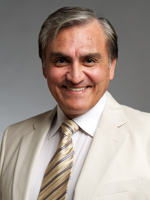
Students in the Bachelor’s in Mechanical Engineering Technology program at the College of Professional Studies are learning from someone working to do just that – faculty member, Fred Lopez. Dr. Lopez recently taught Introduction to Systems in Static Equilibrium, Application of Static Equilibrium, Introduction to Stress Analysis and Application of Stress Analysis.
“There are many methods for getting hydrogen,” says Dr. Lopez. “They’re just not cost-competitive as an energy source. I’m working with scientists at the Russian Academy of Science on a solution that uses nanotechnology. We’ve demonstrated that the technology is viable and cheaper than other methods.”
Dr. Lopez believes his energy research work contributes to how he teaches his classes and how his students learn. “You have to learn by doing things – that’s the essence of engineering,” he says. As essential as hands-on learning is the understanding that engineers play a key role in society, and like Dr. Lopez, may spend decades pursuing ideas and progressing through trial and error.
“Engineers are the ones who create technology and advance civilization,” he says. “I make it clear to my students that they will be the ones called to develop these technologies in the future. They have to be able to continue the work.”